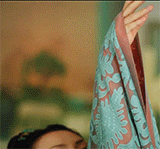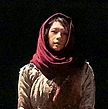'I Want to Prove to Everyone That I Have Talent'
Chinese actress Zhang Ziyi is only 21, but she’s already scorching the screen, from 1999’s “The Road Home” to her spectacular martial-arts debut in Ang Lee’s “Crouching Tiger, Hidden Dragon.” Courted by film directors both in Asia and the U.S., Ziyi gave an extensively candid interview to TIME Asia’s entertainment correspondent Stephen Short and reporter Susan Jakes while shooting her next movie, Warrior, in China’s remote Liaoning province. Edited excerpts:
TIME: Did you have a very lucky and privileged childhood?
Zhang: No. I left home when I was 11 to go away to school. And I had a really tough time there. Even in winter I had to climb out of bed every morning at 5 a.m. to practice gymnastics, and then I wouldn’t be able to go to bed until 11 p.m. I had to really push myself and to depend on myself when I was growing up. I couldn’t rely on my mom and dad to cook for me, or to push me to do my homework. Most importantly the surroundings in which I spent most of my childhood were very different [from that of other children my age]. The atmosphere at my school was very competitive. Young girls were competing with each other every day for status, for leadership, for the affection of the teachers. I hated it. That whole environment was just incompatible with my beliefs and my personality. It was a dark time for me.
TIME: Did you rebel against that or not?
Zhang: Actually I ran away from school when I was 13. No one could find me, and the police were called. I was just hiding in a little thicket of grass at my school, and went to sleep. I wanted to escape so badly. But of course I knew I couldn’t just give up and leave school. It was only when I heard my mom’s voice that I came out of my hiding place.
TIME: Do you still ask your parents for advice on issues?
Zhang: I don’t ask them for advice very often because they’re not really familiar with my present life. So I now pretty much rely on my wonderful friend [the Chinese director] Zhang Yimou. I trust him so much. He’s got so much experience and such mental clarity, such wisdom.
TIME: If I were to talk to some of your best friends, what would they say about you? What are your defining qualities?
Zhang: I think they’d say they like my personality, because I’ve got a northern Chinese personality. I’m pretty impulsive and act on my feelings. So I think that people who like me do so because of this characteristic. The Chinese have a saying “Jiang xin bi xin,” which means to judge another person’s feelings by one’s own. This is how I try to live my life.
TIME: Could you walk away from acting? Are you so impulsive and so rebellious that you could just walk away from all of this?
Zhang: Absolutely not, because in acting I’ve found a domain that suits me perfectly. And that is so utterly rare. Most people spend their whole lives looking for the right job. There are others who never get an opportunity to do work that fulfils them. I’ve suddenly discovered a domain that actually gives me a tremendous amount of space. The satisfaction of being an actress has nothing to do with becoming a star. What I love is this feeling that my emotions are in complete harmony with my work. There’s no way I’ll change my profession.
TIME: How badly do you want to be in a Western film? I recall also that when we spoke six months ago, you said you wanted to learn English.
Zhang: Wanting to be in a Western film won’t get me very far. Unless the opportunity arose, it doesn’t matter how much I want to be in one. But if an opportunity did arise, no actor would pass it up. As for learning English, my biggest motivation is this film [Warrior]. Most of the people on the set speak Korean, and there are very few people who speak Chinese. So we can’t really talk to each other.
TIME: How does it feel to be working on “Warrior?”
Zhang: When two people first meet, they can only have a very ordinary kind of friendship. But when you begin to understand each other, when you get close to them, you discover that you’re suddenly eager to know him or her even better. That’s how I feel about my relationship with this film.
TIME: You’re in talks to star in “Rush Hour II” [the sequel to Jackie Chan and Chris Tucker’s action comedy] What’s happening with that?
Zhang: We’re still working out the details, but I’d be delighted to do the film. The problem at the moment is my busy schedule. Shooting on this film has been extended by a month, but I need to be in the U.S. by Dec. 20.
TIME: If nothing came of “Rush Hour II,” what will you do? Have you committed to any other projects here?
Zhang: There’s a possibility that I might work with Wong Kar-wai next year. I’ve heard that he has a Japanese novel that he wants to turn into a film. We haven’t talked about it yet though. I’ve met him twice and we’ve chatted a bit about my career. He complimented me on my acting in “Crouching Tiger” and said he hoped we’d have an opportunity to work together. Obviously I’d love to work with any of these great directors because every time I’ve worked with them I’ve gained a tremendous amount as an actor. Each director has his own way of pushing you towards improving yourself.
TIME: Have you seen “In the Mood for Love,” Wong Kar-wai’s new film?
Zhang: Yes. I saw it at Cannes.
TIME: Did you think the plot made sense?
Zhang: No.
TIME: But it looked great, right?
Zhang: It was beautiful. There are films you see that only reach your eyes. Then there are films that you can watch…that reach down to your throat, or reach your heart. “In the Mood for Love,” though, reached all the way to my belly.
TIME: Which I think you manage to do as an actress in every film you’ve been in so far.
Zhang: (Laughs) I hope so.
TIME: What was shooting “Crouching Tiger” like?
Zhang: During filming I was anxious, nervous and unsettled because I always felt that Ang Lee had taken a gamble in choosing me in the first place. Ordinarily if an actor gets chosen for the lead in a film, he or she has already built up a repertoire, and everyone knows what he or she is capable of. But I was totally new. I didn’t have a single thing to give to the director to make him trust my abilities. From beginning to end I worried that Ang Lee wouldn’t be satisfied with my work. So I worked as hard as I could to earn his trust, because you only get a chance like this once.
TIME: How difficult was the first week, or two, of shooting “The Road Home?” You had no experience at the time — what are your recollections now of what that was like?
Zhang: I was extremely nervous. We had to do the first shoot 35 times. And it was never used in the final version of the film. (Laughter)
TIME: Was there one champagne moment for you in that film, when you just thought, “God I’m brilliant in that scene?”
Zhang: There was one very special scene at the end of the film. My character, Zhao Di, has been sick. She wakes up and her mother tells her that the man she loves has come back from the city and had spent the day by her bedside. At that moment a single tear appears in the corner of Zhao’s eye and runs down her cheek. That was such a moving moment for me.
TIME: Do you imagine that at some point in your life you can give yourself to a man or woman in the way that your character does in “The Road Home?”
Zhang: I believe that if I love someone I’m afraid it won’t be [the same as in the movie] because our society is developing. It’s impossible for human relations to be as pure as they were in the 1950s. When I love someone they’ll have total possession of my mind, my heart, my actions. But men’s emotions and women’s emotions are not similar. Women’s love is relatively single-minded — when they love someone they throw every ounce of themselves into the relationship. Men are different. When they are in love they may also have other girlfriends.
TIME: Have you been in love — and hurt — at this point in your life?
Zhang: Actually now isn’t the time for me to be falling in love. It’s time for me to work hard.
TIME: Is it easy to watch your own work as an actress and cry?
Zhang: When I watch a movie for the first few times I’m usually thinking about where I was in a given scene, who was next to me, what we were doing etc. But after I’ve gotten through all of this, when I’m really watching the film itself, then I get moved.
TIME: Do you feel living in China is like living in a cage? I mean, do you feel trapped?
Zhang: Not at all. Today’s China is not in the least shut out from the rest of the world. Trends come to us from all over the world. And the Internet is really developed in China. We get news from all over the world. It’s really only in places like this — Xingcheng — where I feel a bit cut off.
TIME: You’ve had a short career up until this point and, boring, boring, boring, you’re always compared to Gong Li. Zhang Yimou has now discovered a new young woman who stars in his next film, Happy Times. Presumably this young girl is going to be called the new Zhang Ziyi, because she can’t be the new Gong Li. How does that make you feel?
Zhang: Zhang Yimou is always going to need young, pretty girls for his films. But I don’t really concern myself with what Zhang Yimou’s next starlet looks like. What does concern me is seizing opportunities to grow as an actor and to improve my skills.
TIME: Tell us something surprising about Zhang Ziyi that we don’t know.
Zhang: Right now a lot of people think that my success has been dependent on luck. But I’m the only one who really understands the difference between the success that everyone acknowledges and the personal successes of my experiences working on all these films. And my success hasn’t just been a question of good luck. What’s more important is that when my lucky moment arrived, I used my own abilities to seize it. There are a lot of people, particularly a lot of Chinese people, who don’t think that way. They think it’s just luck that’s gotten me where I am today. They’re not willing to admit that I’ve also shed blood and tears and often paid dearly for my success. This makes me feel extremely sad.
TIME: Why is it that Chinese people in particular have been so unsupportive, so unwelcoming?
Zhang: Because I’m young and I’ve been so successful. There are actors who spend 20 years working and still don’t achieve what I’ve achieved so quickly. So I think my only course of action is to work as hard as I can, not just for the sake of the film, but also to prove to these people that I do have talent. Criticism of me, while it affects me somewhat, gives me added motivation to silence these people with my actions and my achievements.
TIME: Take Crouching Tiger — it was so warmly welcomed all over the world. It went to so many different countries and so many people liked it, but not in China.
Zhang: I really don’t understand why it’s so different in China. They just don’t endorse or support their own movies and their own actors. Is it because they don’t understand the movie? This issue really baffles me. I mean, imagine if my next film is with Wong Kar-wai. Everyone will say, “That girl has the best luck.” But that’s not really the point. The first and the second time I was chosen for a film involved luck. And I was successful in the context of my luck. But the third time, the fourth time, the fifth time I’m chosen for a film — I don’t think that’s about luck. I have the courage now to stand up and say and that my own abilities have given me luck.
TIME: Does international news of any kind interest you?
Zhang: I’m not really interested in politics, because I think it’s just too removed from my own life. If there’s a war, though, or a disaster, I want to know what’s happening.
TIME: Do you ever think about death? Does it scare you, or are you too young and death is something you don’t consider much.
Zhang: I’m very scared of death. I once had this very good friend and we spent all of our time together. But three years ago she was killed in a car accident. I believe that when you have been given a life you must make yourself worthy of it, because death can come suddenly.
TIME: When are you going to take a holiday, and where are you going to go?
Zhang: I haven’t thought about it much because I’ve got so much work. I especially want to go to Italy. I’ve never been, and maybe I can look for a boyfriend.
TIME: Who would you go with?
Zhang: Actually the people I most want to travel with, if I go abroad on vacation, are my parents. They’ve had such a difficult life and now I have the ability to help them do something they’ve always wanted.
TIME: What about your friends? You’re not in school anymore. What’s your relationship with them like?
Zhang: Actually I don’t have many friends outside of work. I only have a few friends, but they take such good care of me.
TIME: We asked your mother if she regretted your not having a normal childhood, and she replied “No.” Have you ever regretted or had you ever wished to be just an ordinary kid, one of the gang?
Zhang: I have no regrets. When I was young I sometimes felt lonely. But now that I’m older I recognize that what’s most important is having value as a person. That means being able to make other people happy and bring them joy.
 Welcome to Zhang Ziyi Infos, your best source for the Chinese actress since 2007. Zhang Ziyi is a famous actress known for her roles in Crouching Tiger, Hidden Dragon, Memoirs of a Geisha, The Grandmaster and so many other great films. Zhang Ziyi recently directed the short film Poem in the anthology film My Country, My Parents. Read her full biography
Welcome to Zhang Ziyi Infos, your best source for the Chinese actress since 2007. Zhang Ziyi is a famous actress known for her roles in Crouching Tiger, Hidden Dragon, Memoirs of a Geisha, The Grandmaster and so many other great films. Zhang Ziyi recently directed the short film Poem in the anthology film My Country, My Parents. Read her full biography 






















